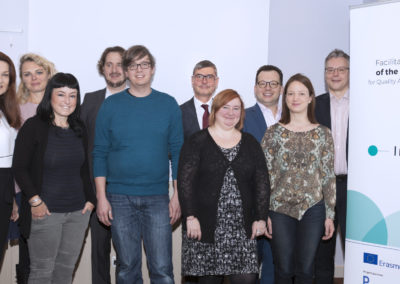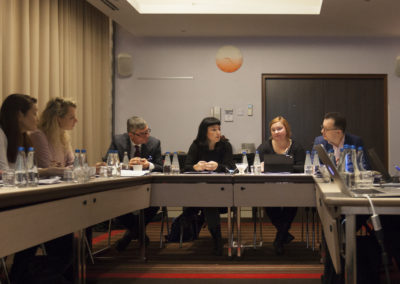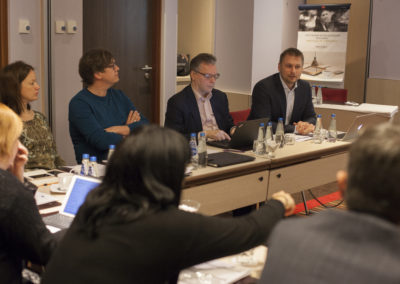“Facilitating implementation of the European Approach for Quality Assurance of Joint Programmes – ImpEA” project has been officially launched on 22nd of November 2017 in Warsaw. The kick-off meeting gathered representatives of all project’s partners and associated partner.
About project consortium
The partnership is composed of 9 partners from 5 countries:
- Polish Accreditation Committee (Poland) – project leader
- European Consortium for Accreditation in Higher Education (The Netherlands)
- European Association for Quality Assurance in Higher Education (Belgium)
- AQAS (Germany)
- Unibasq – Agencia de Calidad del Sistema Universitario Vasco (Spain)
- Adam Mickiewicz University in Poznań (Poland)
- University of Deusto (Spain)
- Warsaw School of Tourism and Recreation (Poland)
- Carl von Ossietzky University of Oldenburg (Germany)
The project is also supported by one associated partner – European Quality Assurance Register (EQAR).
About European Approach and project rationale
The European Approach for Quality Assurance of Joint Programmes has been adopted by European Higher Education Area Ministers in Yerevan in May 2015. It is meant to be a step forward towards minimising barriers in external quality assurance of joint programmes.
The methodology is based on the Standards and Guidelines for Quality Assurance in the European Higher Education Area and therefore it is applicable in different external quality assurance systems across EHEA.
European Approach has been developed to:
– dismantle an important obstacle to the development of joint programmes by setting standards for these programmes that are based on the agreed tools of the EHEA, without applying additional national criteria, and
– facilitate integrated approaches to quality assurance of joint programmes that genuinely reflect and mirror their joint character.
When fully adopted, it will facilitate EHEA-wide automatic recognition of accreditation concerning joint programmes based on single accreditation procedure. Therefore, it will significantly reduce the higher education institutions efforts related with multiple accreditations of such programmes under different national accreditation frameworks and regimes. It will also reduce their struggle with different and sometimes even contradictory legal regulations.
Only few countries have so far fully integrated European Approach into their accreditation procedures. As some initial research show, there are numerous obstacles and difficulties in its implementation. Vast majority of them is related with (to?) lack of supportive national legislations. However, there has only been a handful of successful practical attempts of using the European Approach in accreditation procedures. Therefore, there is a clear need of further exploration of other difficulties in implementation of European Approach, but also providing more of success stories and good practices that might be used as a benchmark by all interested parties.
Project aims and objectives
The main aim of the project is to support efficient implementation of the European Approach for Quality Assurance of Joint Programmes.
This aim will be achieved by successful completion of the following objectives:
- Identifying key obstacles in the implementation of the European Approach in the European Higher Education Area in general, and project partner countries in particular.
- Supporting partner QA agencies in running EA-based programme accreditation procedures in ex-ante and ex-post modes.
- Supporting partner higher education institutions in pursuing the external accreditation based on the EA
- Developing the European Approach implementation online toolkit, as a set of recommendations and proposed solutions for the policy makers, accreditation agencies and higher education institutions. The toolkit will be based on the experience gained through the project but also from other sources.
The project foresees conducting 4 (pilot) accreditation procedures based on the European Approach framework and its methodology. It should considerably increase the number of practical examples and good practices.
Based on that experience, the EA implementation toolkit will be developed. It will be an online and freely available tool and become the main and sustainable outcome of the project. It will gather all available knowledge, good practices and guidance supporting policymakers, quality assurance agencies and higher education institutions in the realisation of the main principles behind the European Approach.



